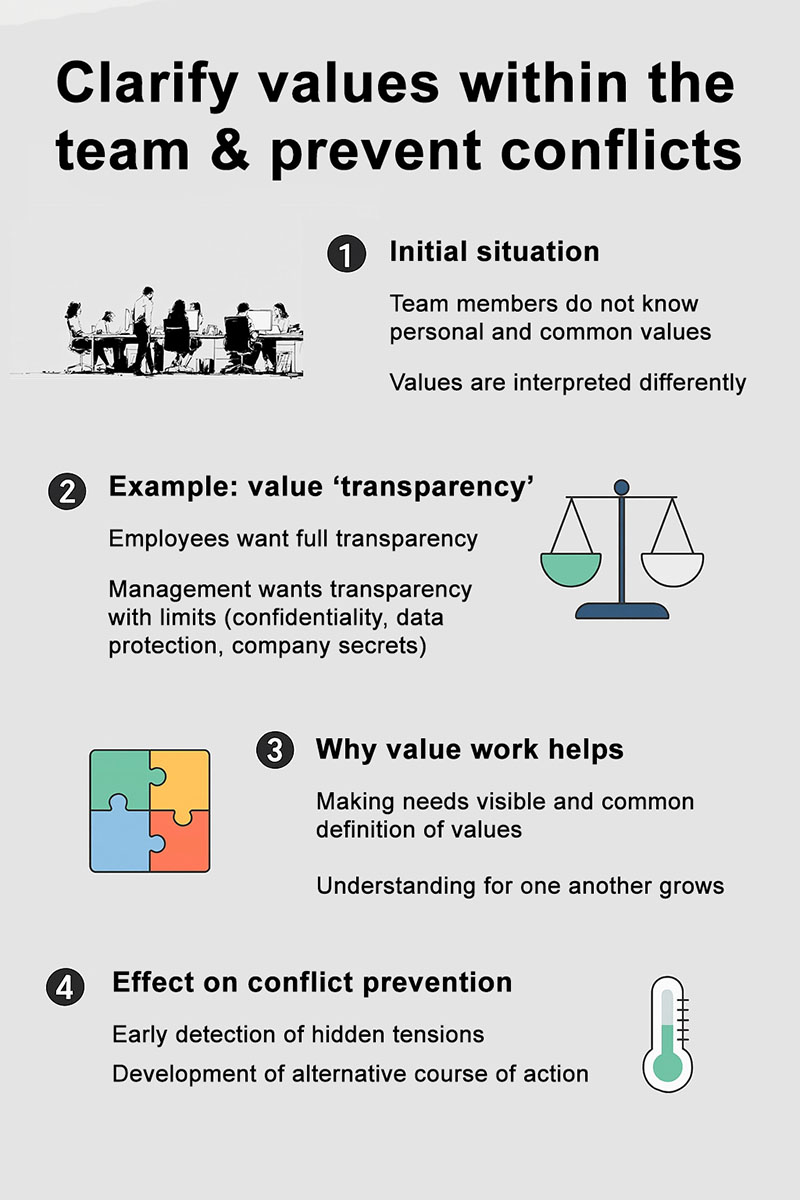How teams become more effective through values
Expand the table of contents
Values as a framework for action
Does this sound familiar?
You have prepared everything for the meeting: organised rooms, sent out invitations and updated and prepared the presentation with all the figures. And then your boss comes around the corner and cancels the meeting.
You set aside time in your calendar this morning to work on the creative concept for the new marketing strategy. But the phone won’t stop ringing and your colleagues are constantly popping into your office to ask for information or just to chat.
Sometimes we deal with situations like this calmly. Sometimes we don’t. Why?
One reason is that our values are not taken into account in such situations. In the first case, it could be the value of structure and order, in the second case, freedom.
Depending on how strongly this inner standard guides us in the respective situation, we can react calmly – or not. Our basic attitudes shape our actions and behavior in our interactions with other people.
This interaction often happens unconsciously. We are attracted to people who share similar beliefs. We see this because we have the same opinion on a topic, pursue similar hobbies, have similar working methods, etc. But we rarely discuss this directly. Or have you ever asked someone you’ve just met, ‘What values are important to you?’ and then mentioned your own?
We all have many values that appeal to us. However, we can only truly ‘live’ a maximum of five to six of them – our guiding values.
Values – the invisible foundation of our actions
During my time as a freelancer, I have become closer to my values and have explored them more deeply. I began by reflecting on which values I currently live by and realised that these five are particularly important to me:
- freedom,
- openness,
- appreciation,
- love and
- reliability.
I quickly realised that some of the people I work with have similar guiding values, meaning that there is a high degree of agreement or similarity.
I also noticed something else: every time I feel upset, annoyed by someone’s behaviour or repeatedly criticise them, it is because at least one of my five guiding values is not being recognised or is even being violated.
From reaction to action: How values empower us to act
This insight showed me options for action. I can influence these situations. If I know which value has been violated, I can say so. I can communicate my needs: e.g., for more reliability when a colleague has postponed the meeting for the third time. Or for freedom when my schedule has once again been controlled by external factors.
And I can also influence situations more in advance. For example, before a meeting, I can say that it is important to me that it ends on time, as reliability is an important value for me. This may also have the positive side effect of not making me appear pedantic or overly organised, as reliability is associated with something positive, whereas simply expressing a desire for a punctual end may be perceived as restrictive. Ideally, there will be an exchange if another person has an issue that is important to them but cannot be accommodated within the allotted time. So we can think about how to deal with this and, for example, appoint a timekeeper, thin out the agenda, arrange a separate meeting, define a clear goal, etc.
By naming the values, the needs of all participants are seen and, ideally, taken into account. Or at least that attention is paid to them. This allows each person to decide for themselves to what extent they want to respond to others and remain ‘calm’ if their own values are not taken into account at that point.
In another instance, I was angry with a cooperation partner because he behaved in an uncollegial manner and I had to fight for my rights in the partnership. In this case, my guiding values of reliability, appreciation and openness were violated. As there were a number of issues, I decided to end the collaboration.
My values therefore provide me with a framework and serve as a basis for my actions. Or to put it another way:
I use them as a
- guide,
- basis for decisions,
- yardstick for my life.
I have found that working with values allows me to control my emotions in certain situations and when dealing with certain issues. Because my value ‘freedom’ is non-negotiable. If someone violates this value, I can act: I address it and express my needs and wishes. [1] Even if this does not improve the situation, I have the opportunity to decide for myself how important my freedom is to me and how I want to deal with it. Working with values therefore enables me to remain capable of acting.
Clarify values within the team before conflicts arise
I use this, for example, in team development and when conflicts arise within teams. Often, members are unaware of their own basic attitudes or those of others in the team, let alone which ones they share. Through values work, they explore these issues and exchange ideas. They get to know each other better and can better understand the behavior of their colleagues.
Each person can live a value differently. It may be that a team has found a common value, such as openness, but each team member interprets and lives it differently.
An example: I had a managing director as a supervisor who said he was open. In fact, a great deal of information was accessible to all employees. However, there was some information that was not communicated openly. This bothered many employees because they understood openness to mean complete openness. However, a managing director must protect the privacy of employees and confidential customer information. Various business information may also need to be disclosed with caution, as everyone interprets information differently.
Discussing what individual people understand by the respective principles and attitudes is an important and necessary step in the value work of teams.
Conflicts in teams do not arise overnight, but develop gradually, imperceptibly and almost unnoticeably. A colleague is frequently absent without anyone really noticing, or a colleague does not deliver results quite as punctually as usual and perhaps no longer with the usual quality. Or the team is no longer putting as much energy into projects to ensure they are completed successfully and deadlines are met.
In conflict mediation, I address the needs of the individual team members. Here, values-based work offers the opportunity to make these needs visible and derive possible solutions. Because if I understand why my colleague is angry that I cancelled the meeting, I can develop other options for action that take my interests into account without making my colleague angry.
Figure: Clarify values within the team and prevent conflicts
Practical tip: Mini workshop outline for values work in a team
When a new team is formed, as is often the case in projects, values work can be done very effectively at the beginning.
As a manager or project leader, I am also part of the team. Ideally, an external moderator should be brought in for team development. If the management decides to take on the moderation itself, its own insights should be taken into account in the exercises and tasks.
Here is a mini workshop outline for values work in a team
Preparation
Plan sufficient time with the team (ideally one day)
- Find a venue (ideally outside the organisation’s premises), including facilitation materials and, if necessary, clarify travel arrangements
- Provide sufficient refreshments (show appreciation for the team)
- Define the goal of the workshop together with the team in advance (SMART: What do we want to achieve and how will we know when we have achieved it?
Start of the workshop:
- Arrive and get in the right frame of mind for the day (led by the supervisor)
- Exercise to get to know each other better and get in the right frame of mind (e.g. write your own user manual, conduct an interview, design and present a poster, brainstorm, etc.)
Values work part 1:
- Find common values (e.g. using the 1-2-3-4-all method)
- Engage in discussion and identify the significance, similarities and differences
Values work part 2:
- How do we deal with differences? (Make concrete agreements)
- What do the values mean for our work (e.g. work with future scenarios and derive how the guiding values become visible here or use the Walt Disney method)
Conclusion
- Joint reflection
- Joint conclusion of the day
If you have the opportunity to use two days for team development, you can also combine vision and values work:
- Develop a shared vision (e.g. using a purpose tournament) and derive how the values help to achieve the vision, developing concrete approaches.
Conclusion: Values enable teams to act and be effective
A shared set of values creates the basis for clear communication and work structures with transparent interfaces in everyday project work.
Working on values helps to recognise potential conflicts at an early stage and develop targeted options for action before tensions arise. It promotes understanding and respectful cooperation.
For me personally, my values are a compass. They help me to assess situations and make conscious decisions: Do I address an offence, terminate a business relationship in extreme cases, or can I remain calm because the value is less important to me at that moment?
A thought to take away
The first step in working on your values begins with simple self-reflection:
- Which values are important to you?
- And which of these are particularly frequently put to the test in your everyday life?
The answers can help you act more consciously, react more calmly and make clearer decisions.
Notes:
Would you like to examine structures within your company, work in a value-oriented manner and strengthen teamwork? Then take a look at the website of Irene Timmers.
Are you interested in a practical example where project work, line structures and a lack of communication led to considerable tension? Then listen to the joint German-language podcast episode by Thomas Wuttke and Irene Timmers: Culture, conflicts and consequences in project management.
[1] Here you will find a blog post on the topic of discussing needs within the team.
Would you like to spread the word as a multiplier? Then feel free to share this article in your network or on social media.

Irene Timmers
Irene Timmers is a management consultant, coach, Agile Coach and mediator in the field of team development with a focus on conflict and project management. Her goal is to strengthen the ability of (project) teams to act and to shape them into successful teams.
In her interactive workshop, she supports people in courageously breaking new ground and experiencing how they can remain capable of acting in difficult team constellations, project situations or even in their private lives.
In the t2informatik Blog, we publish articles for people in organisations. For these people, we develop and modernise software. Pragmatic. ✔️ Personal. ✔️ Professional. ✔️ Click here to find out more.
